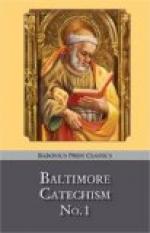LESSON SEVENTEENTH ON INDULGENCES
231. Q. What is an Indulgence? A. An Indulgence is the remission in whole or in part of the temporal punishment due to sin.
233. Q. How many kinds of Indulgences are there? A. There are two kinds of Indulgences—Plenary and Partial.
234. Q. What is a Plenary Indulgence? A. A Plenary Indulgence is the full remission of the temporal punishment due to sin.
235. Q. What is a Partial Indulgence? A. A Partial Indulgence is the remission of a part of the temporal punishment due to sin.
237. Q. What must we do to gain an Indulgence? A. To gain an Indulgence we must be in the state of grace and perform the works enjoined.
LESSON EIGHTEENTH ON THE HOLY EUCHARIST
238. Q. What is the Holy Eucharist? A. The Holy Eucharist is the Sacrament which contains the body and blood, soul and divinity, of our Lord Jesus Christ under the appearances of bread and wine.
245. Q. What do you mean by the appearances of bread and wine? A. By the appearances of bread and wine I mean the figure, the color, the taste, and whatever appears to the senses.
249. Q. When did Christ give His priests the power to change bread and wine into His body and blood? A. Christ gave His priests the power to change bread and wine into His body and blood when He said to the Apostles, Do this for a commemoration of Me.
250. Q. How do the priests exercise this power of changing bread and wine into the body and blood of Christ? A. The priests exercise this power of changing bread and wine into the body and blood of Christ through the words of consecration in the Mass, which are the words of Christ: This is My body; this is My blood.
LESSON NINTEENTH ON THE ENDS FOR WHICH THE HOLY EUCHARIST WAS INSTITUTED
251. Q. Why did Christ institute the Holy Eucharist? A. Christ instituted the Holy Eucharist—
1. To unite us to Himself and to nourish our
soul with His body and
blood.
2. To increase sanctifying grace and all virtues
in our soul. 3. To lessen our evil inclinations.
4. To be a pledge of everlasting life. 5.
To fit our bodies for a glorious resurrection. 6.
To continue the sacrifice of the cross in His Church.
253. Q. What is Holy Communion? A. Holy Communion is the receiving of the body and blood of Christ.
254. Q. What is necessary to make a good Communion? A. To make a good Communion it is necessary to be in the state of grace and to be fasting for one hour from food and all drinks, except water.
[This answer has been changed in the 1977 edition to bring it up to date with the current rules.]
255. Q. Does he who receives Communion in mortal sin receive the body and blood of Christ? A. He who receives Communion in mortal sin receives the body and blood of Christ, but does not receive His grace, and he commits a great sacrilege.




